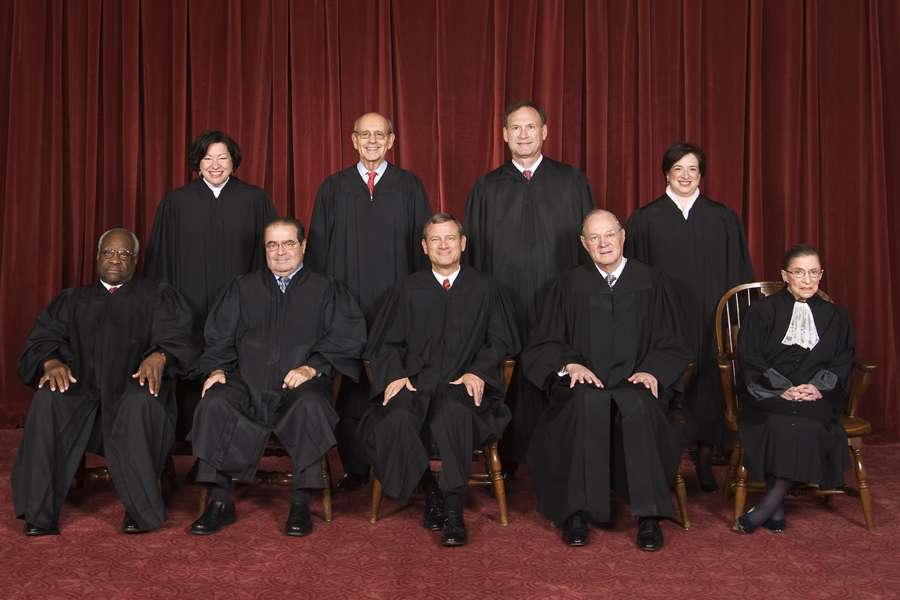The Volokh Conspiracy
Mostly law professors | Sometimes contrarian | Often libertarian | Always independent
Today in Supreme Court History: August 23, 2007
8/23/2007: John Yates, aboard the Miss Katie boat, threw fish overboard to avoid an inspection. He was prosecuted for destroying property to prevent a federal seizure. In Yates v. United States (2015), the Supreme Court held that the fish was not a "record."

Editor's Note: We invite comments and request that they be civil and on-topic. We do not moderate or assume any responsibility for comments, which are owned by the readers who post them. Comments do not represent the views of Reason.com or Reason Foundation. We reserve the right to delete any comment for any reason at any time. Comments may only be edited within 5 minutes of posting. Report abuses.
Please to post comments


Compliments. Fish is not a record.
Besides which, they are perishable in the extreme. What did they expect him to do, bring along a freezer just for the "evidence"? What would they have had him do instead of what he did do?
What was he planning to do with the fish if he hadn't gotten caught?
I am turning myself in.
He should have delivered them unwrapped, some to the agency federal building, and the rest to the federal court.
Same as with the other fish he had caught.
Fishers throw back fish all the time.
But a bee is a fish.
What they don't tell you was he was accused of replacing 72 short fish with 69 new short fish, just a little bigger. Who replaces short fish with new short fish. All b.s. the fish were measured two times. Once frozen. Once partially thawed. They did not know fish shrink on ice. In addition they were measured by state law not federal law. Mountain out of a mole hill.
Lopez v. United States, 404 U.S. 1213 (decided August 23, 1971): Douglas orders draft resister released on his own recognizance; defendant claimed he had not been allowed to assert conscientious objector status after induction date but was now allowed to under Ehlert v. United States, 402 U.S. 99; Ninth Circuit then remanded for reconsideration on issue of whether his belief as to not being able to assert status was in good faith, 451 F.2d 1311.
Jimenez v. U.S. District Ct., S.D. Fla., 84 S.Ct. 14 (decided August 23, 1963): Goldberg denies stay of extradition sought by ex-dictator of Venezuela who had argued that 18 U.S.C. §3188 required him to be freed if more than two months had passed since he was "committed for rendition"; Goldberg "assumes" Venezuela will honor its promise to guard Jimenez's personal safety (in fact it did; he was in jail for five years before trial and sentenced to time served, exiled to Spain, later returned to Venezuela but was disqualified from running for that country's senate)
He had an epiphany and decided to practice catch and release.
1. The fish was a "tangible object", to quote the more relevant part of the statute.
2. Under the best evidence rule, the actual fish is better evidence of the fish, than someone writing down "fish".
3. Under the Court's reasoning, the fish didn't exist if there wasn't a record of it. This reminds me of what Einstein said to a philosopher, "Are you saying the moon doesn't exist unless I look at it?"
"Under the Court's reasoning, the fish didn't exist if there wasn't a record of it. "
This is a total misreading of the court's reasoning. It had nothing to do with the metaphysical existence of fish but that a “tangible object” in the statute is a "tangible object" used to record or preserve information. Nobody uses a fish to store info.
I'm saying the Court's reasoning is incorrect. The statute defines obstruction of justice. Does anyone really write down when he has destroyed evidence?
"The statute defines obstruction of justice. "
It defines a particular type of obstruction of justice, destroying a "record".
He was convicted of another statute for destroying the fish. Its only the records statute that the S/C was dissecting.
"In Yates v. United States (2015), the Supreme Court held that the fish was not a "record.""
It sounds like Yates got punished - eight years to have the Supreme Court say he hadn't committed a crime. Meanwhile, the litigation, the expense, and all the other things which go along with a criminal prosecution, sound like sufficient punishment.
Of course, if you get really technical, punishment is only appropriate if the courts believe you committed a crime. But that's oldthink - if you limit yourself to cases where you can convince the courts, think of how many undesirables would escape justice!
"So long, and thanks for all the records."
Or, if you want a more appropriate joke, the whole thing sounds fishy to me.
The defendant prevailed on the scales of justice.
Is this case only about a fee? Are there other conditions or proof of suitability required?
Boston's subway system required a permit to take pictures. The rule dated from the times when people took pictures using a large camera on a larger tripod. It affected a very small number of people who would cause a minor inconvenience to travelers. By the time everybody carried a pocket camera around the permit was not regulating the commercial photography business. The widely-violated rule remained because bureaucrats can't stand to let go. The government said it was investigating whether applicants were terrorists. You had to prove you were worthy of that picture of rat-infested tracks or urine-soaked elevators. A newspaper shamed them into submission. The regulation was repealed.
How about I repost the above over at "D.C. Circuit Divides on Level of Scrutiny for Regulation of Filming on Federal Property"?
In my day we didn't have tabs. We had Windows and we had to start a second browser to open a second web page. And we liked it!